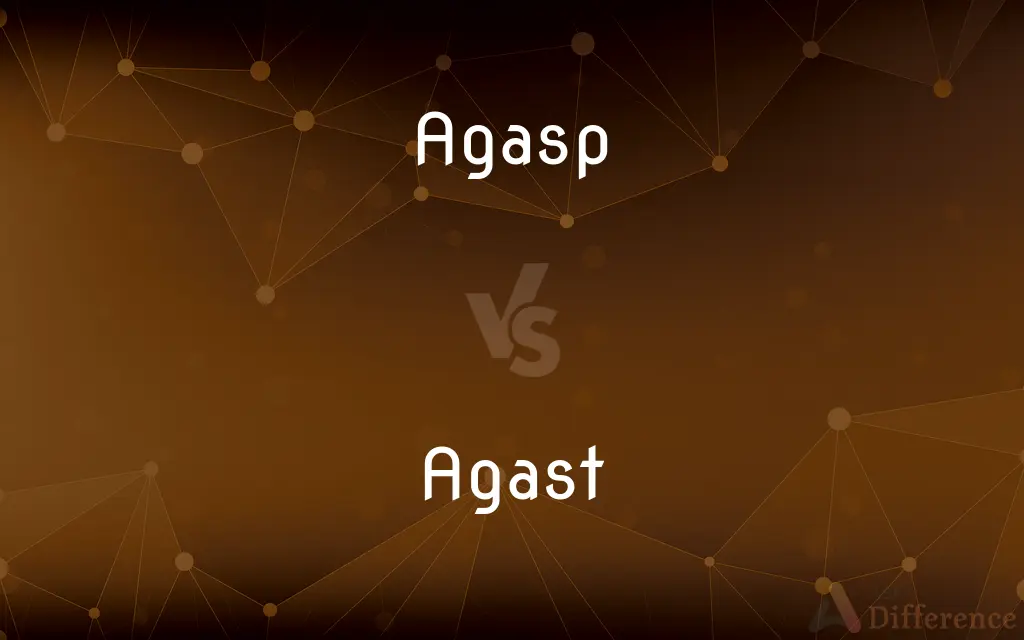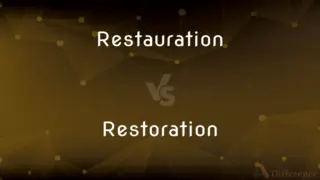Agasp vs. Agast — Which is Correct Spelling?
Edited by Munazza Shafiq — By Tayyaba Rehman — Updated on April 16, 2024
Agasp is the incorrect spelling of agast, which means struck with amazement, terror, or horror.

Table of Contents
Which is correct: Agasp or Agast
How to spell Agast?

Agasp
Incorrect Spelling

Agast
Correct Spelling
ADVERTISEMENT
Key Differences
Remember that the correct word agast contains the letters "a," "g," "a," "s," and "t" sequentially.
Link agast to similar emotion-related words like "aghast," which share a similar structure but differ slightly in spelling.
Use mnemonic: Aghast minus H equals agast, emphasizing the removal of "h."
Think of the word "aghast" without the "h" to help remember agast.
Practice spelling agast by breaking it down into sounds: a-ga-st.
ADVERTISEMENT
How Do You Spell Agast Correctly?
Incorrect: The audience was agasp at the magician's trick.
Correct: The audience was agast at the magician's trick.
Incorrect: She stood agasp at the news of the accident.
Correct: She stood agast at the news of the accident.
Incorrect: Everyone was agasp during the movie's climax.
Correct: Everyone was agast during the movie's climax.
Incorrect: I was agasp when I saw the ghost.
Correct: I was agast when I saw the ghost.
Incorrect: He looked agasp at the overturned car.
Correct: He looked agast at the overturned car.
Agast Definitions
Overwhelmed with shock, surprise, or fear.
The child was agast at the sight of the roller coaster.
Filled with horror or amazement at something unexpected.
She was agast when she discovered the secret door in her room.
Experiencing a sudden and startling emotion.
They were agast at the news of the celebrity's scandal.
Struck with awe or terror.
The climbers were agast at the sheer size of the mountain.
Showing an intense emotional impact from shock.
He was agast at the sudden loss of his friend.
Tlb|en|archaic}} {{alternative spelling of aghast
To affright; to terrify.
See Aghast.
Agast Meaning in a Sentence
He was agast when the snake slithered across his foot.
When the lights suddenly went out, I was agast.
The movie left us all agast with its twist ending.
I was agast at how quickly the weather turned stormy.
The crowd was agast when the fireworks started unexpectedly.
The tourists were agast at the beauty of the Grand Canyon.
I was agast at his suggestion to skip school.
She was agast to hear the loud crash in the kitchen.
She was agast to find her bike stolen.
The fans were agast when the concert was suddenly canceled.
She was agast to learn about the historical events of the city.
The kids were agast at the size of the amusement park.
I was agast when I saw the huge cake made just for me.
The class was agast at the unexpected test the teacher announced.
The teacher was agast at the students' unexpected prank.
They were agast to see the river had flooded the road.
She was agast when she won the lottery.
She was agast to find her favorite show had been canceled.
He was agast at how cold the water was when he jumped in.
I was agast to see someone graffiti the new mural.
We were agast when we saw the deer in our backyard.
He was agast to discover he had been locked out of the house.
We were agast to find the park closed for the day.
We were agast at the amount of homework assigned over the weekend.
The audience was agast when the actor forgot his lines.
Agast Idioms & Phrases
Be agast at something
To be shocked or horrified by something.
I was agast at the chaos in the meeting room.
To look agast
To appear shocked or terrified.
He looked agast when he saw the extent of the damage.
To make agast
To shock or horrify someone.
The horror movie made everyone agast with its intense scenes.
To feel agast
To experience a severe shock or dismay.
She felt agast when she realized she had forgotten the speech at home.
To leave someone agast
To shock or surprise someone to such an extent that they are momentarily speechless.
The plot twist in the novel left everyone agast.
To become agast
To transition into a state of shock or horror.
She became agast as she read the news article.
To gaze agast
To look with shock or horror.
He gazed agast at the unfolding disaster.
To stand agast
To be so surprised, shocked, or frightened that one is momentarily unable to react.
The whole town stood agast after the announcement.
To be caught agast
To be taken by surprise in a shocking or unsettling way.
They were caught agast by the sudden blackout during the event.
To call someone agast
To shock someone through a call or announcement.
His late-night call left her agast with worry.
To react agast
To respond with shock or horror.
The audience reacted agast to the unexpected turn in the play.
To sound agast
To express shock or horror in one's voice.
His voice sounded agast when he spoke of the accident.
To remain agast
To continue feeling shocked or appalled over a period.
The community remained agast weeks after the incident.
To be left agast
To be left in a state of shock after an event.
We were all left agast by the sudden departure of the CEO.
To sit agast
To be in a state of shock while seated, typically unable to move or react.
She sat agast throughout the terrifying movie.
Common Curiosities
How do we divide agast into syllables?
Agast is divided into syllables as a-gast.
How is agast used in a sentence?
Agast is typically used as an adjective describing an intense emotional reaction to something shocking or frightening.
Why is it called agast?
Agast comes from the Middle English word "agasten," which means to frighten or terrify.
How many syllables are in agast?
Agast has two syllables.
What is the pronunciation of agast?
Agast is pronounced as \ə-ˈgast.
What is the root word of agast?
The root word of agast is "gast," which is related to the Old English "gǣstan" meaning to terrify.
What is another term for agast?
Another term for agast is "shocked."
What is the verb form of agast?
Agast does not have a verb form; it is primarily used as an adjective.
What is a stressed syllable in agast?
The stressed syllable in agast is the second syllable, "gast."
Is agast an adverb?
No, agast is not an adverb.
Is the word agast Gerund?
No, agast is not a gerund; it is an adjective and does not have verb forms.
Is the word “agast” a Direct object or an Indirect object?
Agast cannot be a direct or indirect object as it is an adjective, not a noun.
Is agast a noun or adjective?
Agast is an adjective.
Is agast a countable noun?
Agast is not a noun; it is an adjective and therefore does not have countable or uncountable properties.
What is the plural form of agast?
Agast does not have a plural form as it is an adjective.
Is agast an abstract noun?
Agast is an adjective and not a noun, abstract or otherwise.
Is the word agast imperative?
No, agast is not imperative; it is an adjective used to describe a state.
Which article is used with agast?
The definite article "the" or the indefinite articles "a" or "an" can be used with agast, depending on the context and specificity desired in the sentence.
What is the opposite of agast?
The opposite of agast might be unimpressed or unmoved.
Is agast a negative or positive word?
Agast generally conveys a negative emotion as it describes being struck by shock, horror, or terror.
Is agast a vowel or consonant?
Agast is neither a vowel nor a consonant; it is an adjective.
Is agast a collective noun?
Agast is not a noun, collective or otherwise; it is an adjective.
Which determiner is used with agast?
Typically, determiners such as "quite" or "very" can be used with agast to intensify the expression, e.g., quite agast, very agast.
What part of speech is agast?
Agast is an adjective.
What is the singular form of agast?
The singular form of agast is agast itself, as it does not change in number.
Is the agast term a metaphor?
The term agast is not typically used as a metaphor; it directly describes a state of shock or horror.
Which vowel is used before agast?
The usage of a vowel before agast depends on the context and preceding word in a sentence, not a specific rule related to the word agast itself.
Which preposition is used with agast?
Commonly used prepositions with agast can include "at" or "by" depending on the context, e.g., agast at the news, agast by the revelation.
Which conjunction is used with agast?
Conjunctions are not specifically tied to the use of agast; the choice depends on the sentence structure.
Share Your Discovery

Previous Comparison
Dood vs. Dude
Next Comparison
Persue vs. PersuadeAuthor Spotlight
Written by
Tayyaba RehmanTayyaba Rehman is a distinguished writer, currently serving as a primary contributor to askdifference.com. As a researcher in semantics and etymology, Tayyaba's passion for the complexity of languages and their distinctions has found a perfect home on the platform. Tayyaba delves into the intricacies of language, distinguishing between commonly confused words and phrases, thereby providing clarity for readers worldwide.
Edited by
Munazza Shafiq













































